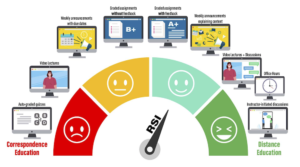
OSCQR standards 2, 3, 29, 38, 39, 41, 43, specifically address Regular and Substantive Interaction (RSI) standards.
2. Course provides an overall orientation or overview, as well as module-level overviews to make course content, activities, assignments, due dates, interactions, and assessments, predictable and easy to navigate/find.
3. Course includes a course information area and syllabus that make course expectations clear and findable.
29. Course offers access to a variety of engaging resources to present content, support learning and collaboration, and facilitate regular and substantive interaction with the instructor.
38. Regular and substantive instructor-to-student expectations, and predictable/scheduled interactions and feedback. are present, appropriate for the course length and structure, and are easy to find.
39. Expectations for all course interactions (instructor to student, student to student, student to instructor) are clearly stated and modeled in all course interaction/communication channels.
41. Course provides activities intended to build a sense of class community, support open communication, promote regular and substantive interaction, and establish trust (e.g., ice-breaking activities, Course Bulletin Board, planned Office Hours, and dedicated discussion forums).
43. Course provides learners with opportunities in course interactions to share resources and inject knowledge from diverse sources of information with guidance and/or standards from the instructor.
OSCQR Standards 1, 6, 9, 10, 19, 30, 31, 40, 44-47, can be leveraged to support and articulate RSI.
1. Course includes Welcome and Getting Started content.
6. Course provides access to learner success resources (technical help, orientation, tutoring).
9. Course objectives/outcomes are clearly defined, measurable, and aligned to learning activities and assessments.
10. Course provides contact information for instructor, department, and program.
19. Instructions are provided and well written.
30. Course provides activities for learners to develop higher-order thinking and problem solving skills, such as critical reflection and analysis.
31. Course provides activities that emulate real world applications of the discipline, such as experiential learning, case studies, and problem-based activities.
40. Learners have an opportunity to get to know the instructor.
44. Course grading policies, including consequences of late submissions, are clearly stated in the Course Information/ Syllabus materials.
45. Course includes frequent, appropriate, and authentic methods to assess the learners’ mastery of content.
46. Criteria for the assessment of a graded assignment are clearly articulated (rubrics, exemplary work).
47. Course provides opportunities for learners to review their performance and assess their own learning throughout the course (via pre-tests, self-tests with feedback, reflective assignments, peer assessment, etc.).
Informational Webinar Recordings:
For more information:

Providing Technical help may be quite the challenge. Hopefully we can find resourses to support this area.